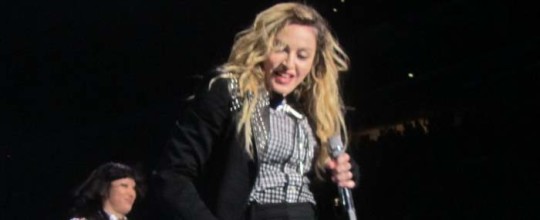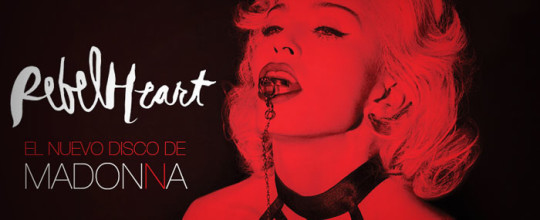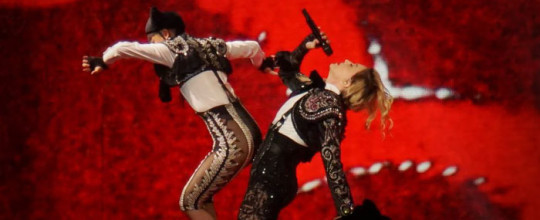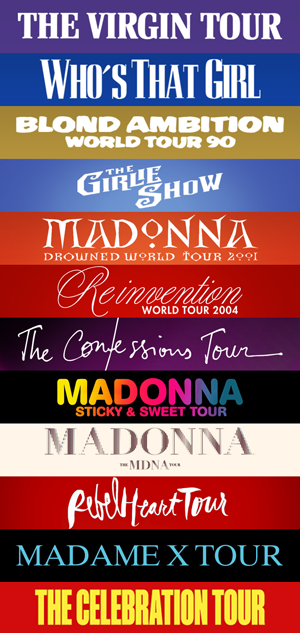 Madonna talks past and future of her live shows with Entertainment Weekly
Madonna talks past and future of her live shows with Entertainment Weekly
In a new interview with Entertainment Weekly‘s Nolan Feeney, Madonna talks about her Rebel Heart Tour’s prescient political messages and why she might be done with arena shows.
Madonna on the rise of Trump: ‘Of course I’m saying I predicted it’
Whether she’s riding a sexy nun like a human surfboard (as one does) or performing stripped-down versions of old hits, no one entertains – or provokes – like Madonna. That much is clear from her Rebel Heart Tour concert film and live album combo, out now, which documents her 2015-16 world tour along with behind-the-scenes footage. But who knows when fans might next get a chance to see her gyrate in front of massive video screens or outdo herself with elaborate costume changes. The Material Girl says she’s pushed arena shows to the limit and is now thinking of developing a smaller, more intimate kind of show. “It’s time for me to take a different approach and really get back down to the beauty and simplicity of music and lyrics,” she tells EW. Below, the 59-year-old looks back on the Rebel Heart Tour’s prescient political messages, dishes on her post-show routines, and gives a tight-lipped (but exciting!) progress report on new music.
EW: This tour opened with ominous video footage of you saying, “When those fascist dictators posing as righteous men come for you…. be prepared to fight for what you believe in.” You recorded that in 2015, but it feels especially timely now.
Madonna: Yeah, people should listen to me! [Laughs]
When you look at the state of the world in 2017, do you think I told you so, or are you surprised about where we find ourselves?
No, I’m not surprised at all. I was already witnessing it on the previous tour: The winds were changing, and people were becoming more and more fearful and marginalized. I thought we were going backwards on a lot of the progress that we’ve made as the human race. So cut to my Rebel Heart Tour and then the election and then what’s happened in the rest of the world — of course I’m saying I predicted it. I’m sure I’m not the only one. A lot of people have been talking about it and trying to call attention to it. But people just want to hear good news, or they want to be distracted. So yes, I did feel like I was warning people.
What role do you think concerts should play in this political climate? Should they be two hours of escapism? Should they feel like rallies or protests?
I can’t speak for other artists, I can only speak for myself. My role obviously is to entertain, but I’m not going to entertain without being provocative. I’m not going to entertain without sharing my point of view, without reflecting what’s going on in the world. That just wouldn’t be me.
There’s a clip of you telling your dancers that doing this show was like going to war every night. What made this tour such a battle? Most reviews noted how much fun you seemed to be having on stage.
When I say war, it’s just what you have to go through every night to do this show. It’s physically a very demanding show. There’s a lot of moving parts going on backstage and underneath the stage. Everyone has to be super organized and vigilant. There’s no room for error. There are 30 seconds to change. You’re passing people under the stage, there are lifts going up and down. There’s a lot of dangerous stuff happening, and you have to fight through all of that and fight your fatigue or whatever personal issues you might be having that evening and get out there. It’s showtime! No matter what’s going on, you have to push through it and be a warrior. Sometimes you’re playing in venues where there’s no air, where people are smoking. There are always challenges. Couple that with your own personal issues — you don’t feel well, you’re sick, one of your dancers is injured. When you do live shows, you never know what can happen, so you do have to have that warrior-going-into-battle mentality. No matter what, you just keep going.
I need about 20 minutes to cool down and go to my dressing room or my hotel room. I do vocal cool-downs. I drink tea for my throat. And I have to wait 20 minutes for the ringing in my ears to go away. Then I come back down to earth. After that, I like to have dinner and socialize in a small way. On tour, it’s too demanding — I can’t go out and party or drink or be crazy. That’s for everybody else. I’m the only one that doesn’t have fun on tour. I don’t want to be alone. Sometimes I get treatments: I get a massage or shiatsu or acupuncture. I watch films — things that get me out of my head and stop worrying. I tend to fixate on mistakes that were made or technical problems that happened. It takes me a couple of hours to unwind.
Rebel Heart, your 13th studio album, featured some of your most vulnerable material in years. Did it feel like you were baring your soul on stage at times with this tour?
I’m not really conscious of it. Sometimes I’m in the mood to share my inner feelings and I’m aware that I’m doing it and feel like it’s the right time. And other times I feel like being more mysterious. I’ve been playing that balancing act for my entire career. A lot of the songs I write are meant to be ironic and not taken literally, and some are just straight-up, “Open my veins, this is who I am.”
As you brainstorm a new kind of show, are you also thinking about recording new music and what’s next on that front?
Yes, I’m doing it all!
Was there anything you haven’t been able to do in an arena show that you’ve wanted to try?
One thing I wanted but was always told was too expensive or too crazy or too dangerous was water. I always wanted water features, like rain or something. But [I was told], “If we’re outside doing a stadium tour, it’s too dangerous if there’s wind. And what if the wind pushes the water into the audience and everyone gets wet? We’re going to have insurance problems. And carrying water around with us is too complicated — too many trucks, too many airplanes, too expensive.” Water was something I always wanted to use in my shows but never did. Beyoncé used it in her last show [the Formation World Tour], but I think she had a lot of problems with it too. It’s good if you don’t move, if you’re stationary and everything is fixed. And if it’s indoors, of course.
Most of your tours have been recorded or broadcast in some capacity. With your past few records, you’ve been putting out these live DVDs almost like clockwork. Why is it important for you to create this archive?
Tours are art. It’s like documenting and archiving your artwork. It’s a record of something I created with a lot of great and talented people: from the musicians I work with to the costumes that are designed, to the songs being arranged in new and different ways, to the political statements I might be making. They’re stages of my career, and they tell a story. They’re an important part of my legacy, so I’m documenting them. There are tours I haven’t documented, and I regret that. I get a lot of s— from people: Why don’t we have a DVD of this, why don’t we have a DVD of that? I’m trying to be more vigilant and document things more than I actually would want to. To film shows is really complicated. It messes up the show. It takes days to film it completely. It takes me three to six months to edit it and mix it. It’s a lot of work, but I think it’s important.
When you watched the footage of this show, was there anything that stood out to you or surprised you that you didn’t notice when you were in the thick of it?
Yeah, I didn’t think some songs would be so moving or so fun to watch, like True Blue. It’s such a simple song. I’m playing the ukulele and just sitting there on stage, but I couldn’t see the audience as closely as the camera did. Then [while watching the footage] I see all these couples together and people kissing and hugging — a real feeling of love and connection — and that really moved me. That was a pleasant surprise.
You worked with some notable fresh talent on Rebel Heart, like rising hitmaker MNEK and a pre-Coloring Book Chance the Rapper. Who has your ear right now?
Well, as you know I moved to Lisbon, and I’ve been listening to a lot of music here, like fado, which is the music of Portugal. There’s such a cultural mix of people and music here. You could go out every night and hear different kinds of music. There’s a great jazz scene here. So right now I’m listening to a lot of local artists I’ve never heard of before, and that’s been really inspiring.







